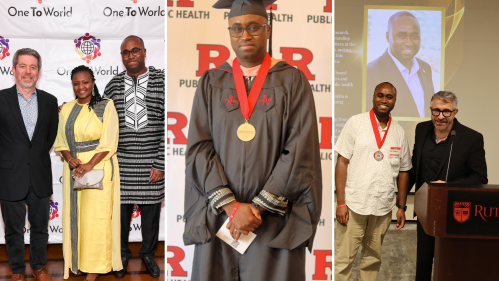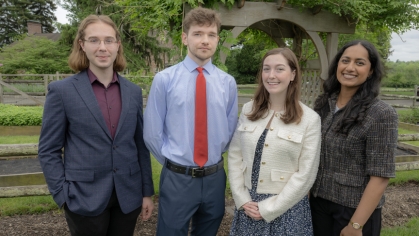Thierno Moustapha Diallo, a Fulbright Rutgers Health student originally from Guinea, received his Master of Public Health (MPH) in Global Public Health from the Rutgers School of Public Health in the spring and was granted the 2025 Stanley S. Bergen Medal of Excellence Award, the school’s highest student honor. As the Bergen awardee, he also delivered the graduate keynote address at the school’s 2025 Convocation ceremony.
Additionally, Diallo was also the recipient of the 2025 Bernard D. Goldstein Award for Global Public Health, which recognizes exceptional academic achievement among masters-level Rutgers School of Public Health students in their concentration.
Carissa McCarthy, Assistant Director for Student Engagement & Special Populations at Rutgers Global, who worked closely with Diallo during his time at Rutgers and helped navigate some unexpected disruptions to the Fulbright program, calls him “a star.” She noted, “I am so proud of all he achieved in his short time here and the impact he had at Rutgers.”
Sarah W. Kelly, Assistant Dean for Student Experiences and Alumni Affairs at the Rutgers School of Public Health, was also impressed with Diallo’s impact at Rutgers. “Beyond his many other accolades, Moustapha was selected to be inducted into the Alpha Eta Chapter of the Delta Omega Honor Society in Public Health at the School of Public Health. The new members are elected based on high academic standards and outstanding performance in scholarship, teaching, research, and community service. Election of membership is also intended to encourage further excellence in and devotion to public health work.”
As Nakaysha Gonzalez notes in an article on the Rutgers School of Public Health site: “Moustapha Diallo brought to his graduate studies a global lens and a strong foundation in clinical care, shaped by his work as a physician in Guinea. His experiences responding to complex health challenges sparked a commitment to advancing public health solutions.” Please see below for a Q&A with Moustapha Diallo.
What inspired you to pursue public health, and how did your time at Rutgers School of Public Health shape your journey?
After medical school in Casablanca, Morocco, I returned home (Guinea) to practice as a primary care physician for more than three years, contributing to the recovery efforts of my country after being the epicenter of the deadliest Ebola epidemic. While I felt privileged to contribute to healing my patients, I progressively realized that the best way to increase the readiness of my country for the next epidemic is through addressing issues at the population level. So, I applied to Fulbright to complete a Master of Public Health in the U.S. I was fortunate to be selected to complete a Global Public Health Master's at Rutgers starting Fall 2023.
At Rutgers, I have gained a deeper understanding of the public health issues I witnessed as a primary care physician. I have also acquired additional skills that would allow me to better contribute to resolving these issues. Furthermore, my time at Rutgers has strengthened my commitment to return to Africa and contribute to increasing readiness for future epidemics such as Ebola, COVID-19, and Mpox.
What was the most rewarding or transformative experience during your time at Rutgers?
The faculty and staff at Rutgers are fantastic. All my professors have left something fertile in me, which is blossoming. Particularly, two professors through my collaborations with them have had the most impact. Prof. Stephan Schwander generously welcomed me into the team of his study in Uganda on tuberculosis and air pollution. This allowed me to witness firsthand how collaboration between US and African researchers creates productive synergies to address complex problems. My passion for this project explains why I selected it for my APE and capstone. Prof. Rafael E. Pérez-Figueroa, for whom I acted as research assistant, has been a tremendous mentor, professionally and personally.
Under his mentorship, I learned how impactful it is to embed community engagement in research projects. I have been humbled by Promotoras, the female Spanish-speaking community health workers with whom we work to address health inequities in New Brunswick. My experiences at Rutgers will fuel my work and life moving forward.
You were recognized with the 2025 Stanley S. Bergen, Jr., MD, Medal of Excellence and the 2025 Bernard D. Goldstein Award for Global Public Health. What does receiving these awards mean to you?
I am truly humbled to receive these awards. I accept them, understanding that I must remain true to the ethos underpinning them: "To whom much is given, much is expected." These awards further empower me to impact others positively.
What advice would you give to current and future public health students?
This is a cliché. But the most profound truths are simple clichés. Strive to leave something fertile that will blossom with each person you meet. We are truly measured through our impact on others. Ultimately, that is the only thing that stays and is passed on from one person to another. I will do my best to pass on the fertile gifts I received at Rutgers, and I hope those I pass them to will pass them on to others. So on and so forth.
What’s next after graduation, and how do you hope to make an impact in public health?
I will begin my PhD in Molecular Epidemiology at the Maryland School of Medicine in Baltimore in mid-August. Through that program, I hope to acquire more the required skills and resources to return home and contribute to strengthening public health in Guinea and Africa.
Here is the link to the article on the Rutgers School of Public Health website.




